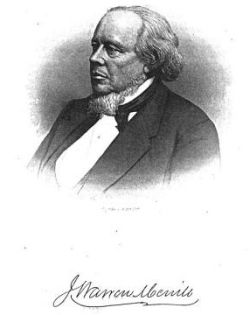 J. Warren Merrill of Cambridge, Massachusetts, is a successful businessman and local civic leader. He serves as mayor of Cambridge from 1865-1867.
J. Warren Merrill of Cambridge, Massachusetts, is a successful businessman and local civic leader. He serves as mayor of Cambridge from 1865-1867.
He is also a Baptist, having been baptized in the Baldwin Place Baptist Church in Boston in 1833. Now, his membership resides with the Cambridge Baptist Church. In addition, Merrill is a leader among northern Baptists.
A biography of Merrill speaks of his churchmanship and his Christian character and commitment:
“…. known as a lover of the church; a man of effort for the salvation of others; a man of prayer; a liberal man that devised liberal things. The erection of this church’s second house went on at the same time with that of his own home, and he probably devoted about equal amounts of money to each …. Decided in his religious, political, and other convictions, Mr. Merrill was, at the same time, able to take broad and Catholic views …. a large man by nature, enlarged by New England education, by Christianity accepted as personal religion, by living heroically in a heroic time, by seeing much of men and manners in his own country, and in prolonged tours of foreign travel, and by sitting (as he did for years in the missionary organization of his communion) at a council-board for the world’s evangelization.”
The Baptist “missionary organization” referred to is the Triennial Convention, American Baptists’ first national organization – founded in 1814 – from which Southern Baptists withdrew in 1845 in order to defend the institution of African slavery. From that point onward, the Triennial Convention served as the national denominational organization of Baptists in the North. Merrill served on a regional advisory committee of the Convention.
In addition, the language of Merrill’s biography speaks to the times. The Second Great Awakening of the early nineteenth century placed emphasis on a personal encounter with Christ (“personal religion”), while a “New England education” and a “liberal” nature spoke to a growing northern Baptist awareness of Christian responsibility to meet human needs in urban regions.
“An ardent patriot,” days after the firing upon Fort Sumter Merrill takes a lead among the prominent men of Cambridge in recruiting soldiers for the cause of the Union.
Sources: Merrill’s biography and illustration is found in Duane Hamilton Hurd, A History of Middlesex County, Massachusetts (Philadelphia: J.W. Lewis, 1890), pp. 230-232 (link); also see American Baptist Yearbook, 1873, p. 28 (link)


